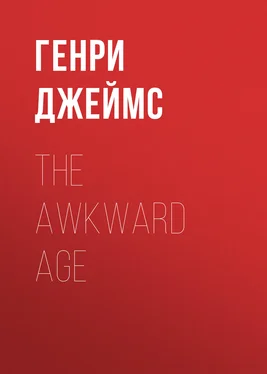Генри Джеймс - The Awkward Age
Здесь есть возможность читать онлайн «Генри Джеймс - The Awkward Age» — ознакомительный отрывок электронной книги совершенно бесплатно, а после прочтения отрывка купить полную версию. В некоторых случаях можно слушать аудио, скачать через торрент в формате fb2 и присутствует краткое содержание. Жанр: foreign_prose, foreign_antique, на английском языке. Описание произведения, (предисловие) а так же отзывы посетителей доступны на портале библиотеки ЛибКат.
- Название:The Awkward Age
- Автор:
- Жанр:
- Год:неизвестен
- ISBN:нет данных
- Рейтинг книги:5 / 5. Голосов: 1
-
Избранное:Добавить в избранное
- Отзывы:
-
Ваша оценка:
- 100
- 1
- 2
- 3
- 4
- 5
The Awkward Age: краткое содержание, описание и аннотация
Предлагаем к чтению аннотацию, описание, краткое содержание или предисловие (зависит от того, что написал сам автор книги «The Awkward Age»). Если вы не нашли необходимую информацию о книге — напишите в комментариях, мы постараемся отыскать её.
The Awkward Age — читать онлайн ознакомительный отрывок
Ниже представлен текст книги, разбитый по страницам. Система сохранения места последней прочитанной страницы, позволяет с удобством читать онлайн бесплатно книгу «The Awkward Age», без необходимости каждый раз заново искать на чём Вы остановились. Поставьте закладку, и сможете в любой момент перейти на страницу, на которой закончили чтение.
Интервал:
Закладка:
“Let her at least know how to be bad? Ah,” Mitchy replied, “your irritation testifies more than anything else could do to our peculiar genius or our peculiar want of it. Our vice is intolerably clumsy—if it can possibly be a question of vice in regard to that charming child, who looks like one of the new-fashioned bill-posters, only, in the way of ‘morbid modernity,’ as Mrs. Brook would say, more extravagant and funny than any that have yet been risked. I remember,” he continued, “Mrs. Brook’s having spoken of her to me lately as ‘wild.’ Wild?—why, she’s simply tameness run to seed. Such an expression shows the state of training to which Mrs. Brook has reduced the rest of us.”
“It doesn’t prevent at any rate, Mrs. Brook’s training, some of the rest of you from being horrible,” the Duchess declared. “What did you mean just now, really, by asking me to explain before Aggie this so serious matter of Nanda’s exposure?” Then instantly taking herself up before Mr. Mitchett could answer: “What on earth do you suppose Edward’s saying to my darling?”
Brookenham had placed himself, side by side with the child, on a distant little settee, but it was impossible to make out from the countenance of either if a sound had passed between them. Aggie’s little manner was too developed to show, and her host’s not developed enough. “Oh he’s awfully careful,” Lord Petherton reassuringly observed. “If you or I or Mitchy say anything bad it’s sure to be before we know it and without particularly meaning it. But old Edward means it—”
“So much that as a general thing he doesn’t dare to say it?” the Duchess asked. “That’s a pretty picture of him, inasmuch as for the most part he never speaks. What therefore must he mean?”
“He’s an abyss—he’s magnificent!” Mr. Mitchett laughed. “I don’t know a man of an understanding more profound, and he’s equally incapable of uttering and of wincing. If by the same token I’m ‘horrible,’ as you call me,” he pursued, “it’s only because I’m in everyway so beastly superficial. All the same I do sometimes go into things, and I insist on knowing,” he again broke out, “what it exactly was you had in mind in saying to Mrs. Brook the things about Nanda and myself that she repeated to me.”
“You ‘insist,’ you silly man?”—the Duchess had veered a little to indulgence. “Pray on what ground of right, in such a connexion, do you do anything of the sort?”
Poor Mitchy showed but for a moment that he felt pulled up. “Do you mean that when a girl liked by a fellow likes him so little in return—?”
“I don’t mean anything,” said the Duchess, “that may provoke you to suppose me vulgar and odious enough to try to put you out of conceit of a most interesting and unfortunate creature; and I don’t quite as yet see—though I dare say I shall soon make out!—what our friend has in her head in tattling to you on these matters as soon as my back’s turned. Petherton will tell you—I wonder he hasn’t told you before—why Mrs. Grendon, though not perhaps herself quite the rose, is decidedly in these days too near it.”
“Oh Petherton never tells me anything!” Mitchy’s answer was brisk and impatient, but evidently quite as sincere as if the person alluded to had not been there.
The person alluded to meanwhile, fidgeting frankly in his chair, alternately stretching his legs and resting his elbows on his knees, had reckoned as small the profit he might derive from this colloquy. His bored state indeed—if he was bored—prompted in him the honest impulse to clear, as he would have perhaps considered it, the atmosphere. He indicated Mrs. Donner with a remarkable absence of precautions. “Why, what the Duchess alludes to is my poor sister Fanny’s stupid grievance—surely you know about that.” He made oddly vivid for a moment the nature of his relative’s allegation, his somewhat cynical treatment of which became peculiarly derisive in the light of the attitude and expression, at that minute, of the figure incriminated. “My brother-in-law’s too thick with her. But Cashmore’s such a fine old ass. It’s excessively unpleasant,” he added, “for affairs are just in that position in which, from one day to another, there may be something that people will get hold of. Fancy a man,” he robustly reflected while the three took in more completely the subject of Mrs. Brookenham’s attention—“fancy a man with THAT odd piece on his hands! The beauty of it is that the two women seem never to have broken off. Blest if they don’t still keep seeing each other!”
The Duchess, as on everything else, passed succinctly on this. “Ah how can hatreds comfortably flourish without the nourishment of such regular ‘seeing’ as what you call here bosom friendship alone supplies? What are parties given for in London but—that enemies may meet? I grant you it’s inconceivable that the husband of a superb creature like your sister should find his requirements better met by an object comme cette petite, who looks like a pen-wiper—an actress’s idea of one—made up for a theatrical bazaar. At the same time, if you’ll allow me to say so, it scarcely strikes one that your sister’s prudence is such as to have placed all the cards in her hands. She’s the most beautiful woman in England, but her esprit de conduite isn’t quite on a level. One can’t have everything!” she philosophically sighed.
Lord Petherton met her comfortably enough on this assumption of his detachments. “If you mean by that her being the biggest fool alive I’m quite ready to agree with you. It’s exactly what makes me afraid. Yet how can I decently say in especial,” he asked, “of what?”
The Duchess still perched on her critical height. “Of what but one of your amazing English periodical public washings of dirty linen? There’s not the least necessity to ‘say’!” she laughed. “If there’s anything more remarkable than these purifications it’s the domestic comfort with which, when all has come and gone, you sport the articles purified.”
“It comes back, in all that sphere,” Mr. Mitchett instructively opined, “to our national, our fatal want of style. We can never, dear Duchess, take too many lessons, and there’s probably at the present time no more useful function to be performed among us than that dissemination of neater methods to which you’re so good as to contribute.”
He had had another idea, but before he reached it his companion had gaily broken in. “Awfully good one for you, Duchess—and I’m bound to say that, for a clever woman, you exposed yourself! I’ve at any rate a sense of comfort,” Lord Petherton pursued, “in the good relations now more and more established between poor Fanny and Mrs. Brook. Mrs. Brook’s awfully kind to her and awfully sharp, and Fanny will take things from her that she won’t take from me. I keep saying to Mrs. Brook—don’t you know?—‘Do keep hold of her and let her have it strong.’ She hasn’t, upon my honour, any one in the world but me.”
“And we know the extent of THAT resource!” the Duchess freely commented.
“That’s exactly what Fanny says—that SHE knows it,” Petherton good-humouredly agreed. “She says my beastly hypocrisy makes her sick. There are people,” he pleasantly rambled on, “who are awfully free with their advice, but it’s mostly fearful rot. Mrs. Brook’s isn’t, upon my word—I’ve tried some myself!”
“You talk as if it were something nasty and homemade—gooseberry wine!” the Duchess laughed; “but one can’t know the dear soul, of course, without knowing that she has set up, for the convenience of her friends, a little office for consultations. She listens to the case, she strokes her chin and prescribes—”
Читать дальшеИнтервал:
Закладка:
Похожие книги на «The Awkward Age»
Представляем Вашему вниманию похожие книги на «The Awkward Age» списком для выбора. Мы отобрали схожую по названию и смыслу литературу в надежде предоставить читателям больше вариантов отыскать новые, интересные, ещё непрочитанные произведения.
Обсуждение, отзывы о книге «The Awkward Age» и просто собственные мнения читателей. Оставьте ваши комментарии, напишите, что Вы думаете о произведении, его смысле или главных героях. Укажите что конкретно понравилось, а что нет, и почему Вы так считаете.












